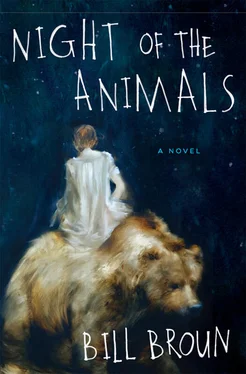TOWARD THE END OF JANUARY, Harry9’s newly empowered Privy Council asked that Parliament study another series of social reforms, this time regarding what it called “quality of life” and “national civility” issues. It was said to be motivated by the continued spread of the most powerful of the new suicide cults — Heaven’s Gate — but it sent a chill through the NHS Élite and its harried GPs. This particular cult, which practiced ritual mass suicide along with mass animal sacrifices, had begun to infiltrate the Indigent populations, who had heretofore seemed immune to its promises of human transcendence to a “Next Level.” There were suspicions, too, that Heaven’s Gate was secretly behind the spread of Flōt addiction, and this was beginning to panic the rising British aristocracy (and, indeed, ruling classes around the world). The voteless Indigents were, after all, Britain’s new workforce par excellence.
The homeless, seen as especially vulnerable, were to be moved assertively toward controversial, unproven Nexar treatments if they wanted to keep their benefits. All provisions for any kind of free psychotherapy, except for something called “Family Integrity Counseling,” were to be abolished. Among the most powerful aristocrats, only a very young former Earl of Worcester, a callow thorn in Harry9’s side and distant cousin, promised to fight the proposals. Dr. Bajwa himself felt furious over the proposals, but powerless.
“I saw that Earl of Worcester on the TV,” Baj was telling Cuthbert. “They’ve said he’s secretly in deep with the Army of Anonymous, and some of the Irish Underground, but I don’t know. What do you think, Cuthbert? He sure doesn’t like Harry. Of course, Harry makes hatred very easy. But if it weren’t for Worcestershire, they say, Harry would have taken over every mind in Europe. He’s afraid. He’s still afraid of going too far — thank heavens.”
Cuthbert pursed his lips. “All these powerful people — none of them are really listenin’—not to me, not to anyone anymore. Not really. Not hard. If they were, they’d hear what’s coming — and it’s not good. But I don’t mind the king. I’ve not much use for this Earl of Worcester bloke.”
“What’s coming, my friend?”
“The end.”
ONE DAY, soon after this, Dr. Bajwa found himself wheezing badly after taking a run in Finsbury Park. He needed to bend over in his sky-blue training jacket and magnetic running shoes to gasp for breath. He coughed, and he noticed a few bright flecks of blood on his hand. A homeless man with an oily brown beanie hat and no upper front teeth saw him and put his hand on Baj’s back.
“Easy, mate,” the Indigent said. “You’re awright.”
“Right,” he said. “Fit as a fid—” He coughed again. “Fiddle!”
The doctor had no history of asthma or bronchitis, and he had never used tobacco, so he mostly felt unworried. Still, it was strange.
A few days later, Baj visited his own NHS Legacy GP, a white-mustachioed internist on Harley Street.
Dr. Peter Bonhomme was an even-tempered pragmatist who had survived the paroxysms of the new monarchy by feigning sentimentality when it came to politics. He always wore an old commemorative House of Windsor badge pin issued to mark Elizabeth II’s death. He was short, round, and strong, and apart from his shaky hands, looked not unlike his pin’s squat, stolid depiction of the Tower of Windsor. He was a kindly man, and Baj considered him a heartening presence if not quite a friend.
Dr. Bonhomme never wasted time. He drew blood, listened to Baj’s chest with a mediscope, and gave him a cloudy plastic cup for urinalysis.
“Right,” he said, with a characteristic firmness. “So how are you doing otherwise?” he asked.
“All is well,” Baj said. He felt anxious to talk, but he couldn’t bring himself to say much. An old indisposition to show weakness held him back. He almost would have felt more comfortable sharing with a social lesser — even Cuthbert.
“I’m all right,” he added. “You know, ‘getting on with it.’ Are you well?”
“I’m glad to be working still.”
“You call this work, on Harley Street?” Dr. Bajwa teased. At one time, such a quip between professionals would have seemed more amusing, he realized. “Sorry,” he said. “I couldn’t resist.”
“No worries, Baj!” said Dr. Bonhomme, grinning, and looking at his mediscope’s floating holographic readout, which plotted a colored ball — in this case red — onto a shoe box — size three-dimensional quadrangle that the doctor analyzed. “We’re lucky to be working at all these days,” he said.
“Yes,” said Baj. Were he to say any more, he knew, the conversation would be edging toward treason. He left it there.
Dr. Bonhomme slid a white ultrasonic camera out of a small plastic case and dimmed the lights. The older doctor smiled gently at Baj for a moment, but then seemed lost in trying to work the camera.
“Hold still now,” he said, “and raise your arms up.” Baj complied. Four faint hums ensued — and it was over.
The aged Dr. Bonhomme could barely hold the heavy camera steady as he guided it onto a wet-titanium gooseneck base. Two lurid blue-white biometric eyes awakened above the lens. He rubbed the top of the camera for a moment, as if petting a baby white shark, and the camera instantaneously projected four-dimensional pathological extrapolations of Baj’s insides on the wall.
Baj looked at white petals of a neoplasm, unfolding on the wall. There it was — a pale flower of death in the right lobe of his lung.
Dr. Bonhomme’s face had fallen. He glanced nervously at Baj.
“But I don’t smoke,” said Baj. “This can’t be.”
There was a pause. Dr. Bonhomme said hoarsely, “We can do a lot these days — even with lungs.” He appeared to collect himself for a moment. He stood up a little taller, then spoke confidently: “Right now. These are but ‘shadows of things to come,’ as they say. But you’re going to need an oncologist. And you might consider a day or two of Nexar — just to destress, right?”
“I don’t use the hoods,” said Baj, in a tone of subdued annoyance, and Dr. Bonhomme nodded.
There was another pause. Dr. Bonhomme nodded and put his hand on his peer’s shoulder.
“Look, I won’t claim to understand how you feel,” he said. “I’d react the same way, honestly.” He switched off the ultrasonic camera, and the screen popped off with a tiny shriek. “But it’s not like the twentieth century, is it? I’m sorry, Baj. But it’s not a death sentence. And just thank bloody god you’re in Legacy.”
“God couldn’t give a fuck about me,” said Baj.
Dr. Bajwa had an incipient lung tumor. Treated, it wasn’t necessarily terminal, he knew, but the five-year survival rate was still only 50 percent. Whole new metastasizing cancers and newly aggressive viral syndromes remained significant medical foes, even in this era of 120-year-plus life spans. The problem was, for the rich, the development of a variety of new, improved, salable BodyMods — especially CoreMods (through which most major organs, apart from brains, could be easily refurbished), and EverConnectors (synthetic, fibrous connective tissue-sleeves) — as well as new cartilage chemotherapies — had long supplanted the search for cures in terms of much research. For everyone else, and especially Indigents, Nexar hoods as well as ordinary intoxicants — even Flōt — made cancer less menacing.
As Baj left Dr. Bonhomme’s office and headed toward his parking spot, he found himself silently running through part of a prayer from his childhood. Gaavai, kotaan. Havai kisai taan , he remembered. Some sing of his power. Who has that power?
An advert for Lucozade suddenly appeared on his corneas — the usual unwanted Opticalls you got walking through central London. There were dozens of grades of freedom from daytime Optispam bursts (after dark, the burst-rates fell considerably). You had to pay a huge monthly fee to keep all the adverts off your eyes, and even with his comparatively good income, he couldn’t afford the top service (although in recent years, many brains had adapted to Optispam and begun, partially, to block it out — a neurological “anomaly” the authority’s tech teams remained unable to defeat). A nude, dark-haired woman with absurdly large breasts and a startled look was shaking a Lucozade bottle in an obviously raunchy manner. “Great performance is easy to get into your hands,” she cooed. The images broke Baj’s attention, of course, and with that came a ferocious urge to bite out his own eyes.
Читать дальше












